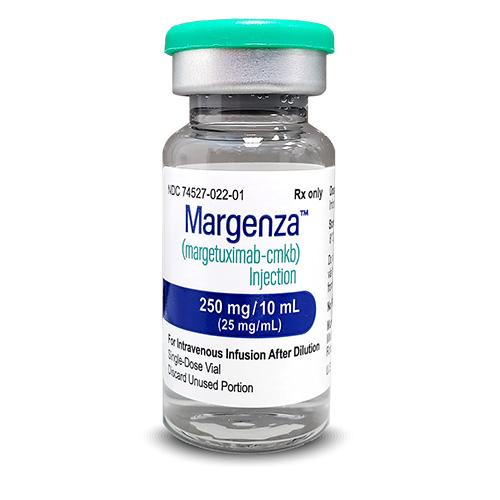Margetuximab Side Effects
Medically reviewed by Drugs.com. Last updated on Oct 23, 2024.
Applies to margetuximab: intravenous solution.
Important warnings
This medicine can cause some serious health issues
Intravenous route (solution)
Warning: Left Ventricular Dysfunction and Embryo-fetal Toxicity. Left Ventricular Dysfunction: Margetuximab-cmkb may lead to reductions in left ventricular ejection fraction (LVEF).
Evaluate cardiac function prior to and during treatment.
Discontinue margetuximab-cmkb treatment for a confirmed clinically significant decrease in left ventricular function.Embryo-fetal Toxicity: Exposure to margetuximab-cmkb during pregnancy can cause embryo-fetal harm.
Advise patients of the risk and need for effective contraception.
Precautions
It is very important that your doctor check your progress at regular visits to make sure that this medicine is working properly. Blood tests may be needed to check for unwanted effects.
Receiving this medicine while you are pregnant can harm your unborn baby. If you are a woman who can bear children, your doctor may give you a pregnancy test before you start using this medicine to make sure you are not pregnant. Use an effective form of birth control to keep from getting pregnant during treatment with this medicine and for at least 4 months after the last dose. If you think you have become pregnant while receiving the medicine, tell your doctor right away.
This medicine may cause heart problems (eg, left ventricular dysfunction). Check with your doctor right away if you have chest pain, decreased urine output, dilated neck veins, irregular breathing, irregular heartbeat, swelling of the face, fingers, feet, or lower legs, tightness in the chest, trouble breathing, unusual tiredness or weakness, or weight gain.
This medicine may cause infusion-related reactions, which can be life-threatening and require immediate medical attention. Tell your doctor right away if you start to have a fever, chills or shaking, dizziness, trouble breathing, itching or rash, lightheadedness or fainting after receiving this medicine.
Do not take other medicines unless they have been discussed with your doctor. This includes prescription or nonprescription (over-the-counter [OTC]) medicines and herbal or vitamin supplements.
Serious side effects of margetuximab
Along with its needed effects, margetuximab may cause some unwanted effects. Although not all of these side effects may occur, if they do occur they may need medical attention.
Check with your doctor or nurse immediately if any of the following side effects occur while taking margetuximab:
More common side effects
- back pain
- chest pain or tightness
- chills
- cough
- decreased urine output
- difficulty in moving
- dilated neck veins
- fever
- flushing
- headache
- irregular breathing
- irregular heartbeat
- muscle aches, cramps, pain, or stiffness
- nausea and vomiting
- pain in the joints
- redness, swelling, pain of the skin
- scaling of the skin on the hands and feet
- swelling of the face, fingers, feet, or lower legs
- swollen joints
- tingling of the hands and feet
- trouble breathing
- ulceration of the skin
- unusual tiredness or weakness
- weakness
- weight gain
Other side effects of margetuximab
Some side effects of margetuximab may occur that usually do not need medical attention. These side effects may go away during treatment as your body adjusts to the medicine. Also, your health care professional may be able to tell you about ways to prevent or reduce some of these side effects.
Check with your health care professional if any of the following side effects continue or are bothersome or if you have any questions about them:
More common side effects
- arm or leg pain
- burning, numbness, tingling, or painful sensations
- constipation
- decreased appetite
- diarrhea
- hair loss, thinning of hair
- stomach pain
- unsteadiness or awkwardness
- weakness in the arms, hands, legs, or feet
See also:
For healthcare professionals
Applies to margetuximab: intravenous solution.
General adverse events
- Very common (10% or more): Fatigue/Asthenia (57%), pyrexia (19%), infusion related reaction (13%)
- Common (1% to 10%): Fatal adverse reactions (1.1%)[Ref]
Immunologic
- Common (1% to 10%): Immunogenicity (1.7%)[Ref]
Musculoskeletal
Hepatic
- Very common (10% or more): Increased serum alanine aminotransferase (32%), increased serum aspartate aminotransferase (23%), increased serum alkaline phosphatase (21%)[Ref]
Respiratory
- Very common (10% or more): Cough (14%), dyspnea (13%)
- Uncommon (0.1% to 1%): Aspiration pneumonia (0.4%), viral pneumonia(0.8%)[Ref]
Hematologic
- Very common (10% or more): Decreased hemoglobin (52%;), decreased leukocytes (40%), decreased lymphocytopenia (31%), increased INR (24%;), increased aPTT (32%)
- Common (1% to 10%): Febrile neutropenia (1.5%), neutropenia/neutrophil count decrease (1.5%)[Ref]
Nervous system
- Very common (10% or more): Headache (19%), peripheral neuropathy (16%)
- Common (1% to 10%): Dizziness (10%), insomnia (6%)[Ref]
Renal
- Very common (10% or more): Increased serum creatinine (68%)[Ref]
Cardiovascular
Dermatologic
- Very common (10% or more): Alopecia (18%), palmar-plantar erythrodysesthesia (13%)
- Common (1% to 10%): Skin rash (6%)[Ref]
Endocrine
- Common (1% to 10%): Decreased weight (6%), increased serum lipase (30%),[Ref]
Gastrointestinal
- Very common (10% or more): Abdominal pain (17%), constipation (19%), increased serum lipase (30%), decreased appetite (14%), nausea (33%), vomiting (21%), diarrhea (25%)
- Common (1% to 10%): Dysgeusia (6%), stomatitis (10%)[Ref]
References
1. (2021) "Product Information. Margenza (margetuximab)." Almirall
More about margetuximab
- Check interactions
- Compare alternatives
- Dosage information
- During pregnancy
- Drug class: HER2 inhibitors
- Breastfeeding
- En español
Patient resources
Other brands
Professional resources
Other brands
Related treatment guides
Further information
Margetuximab side effects can vary depending on the individual. Always consult your healthcare provider to ensure the information displayed on this page applies to your personal circumstances.
Note: Medication side effects may be underreported. If you are experiencing side effects that are not listed, submit a report to the FDA by following this guide.

